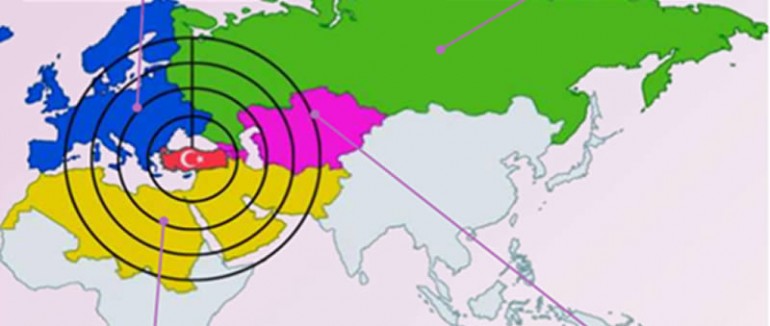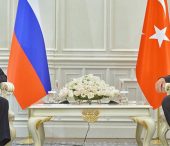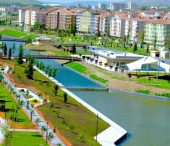Turkey, which has the fastest growing economy in Europe, continues to be a center of attraction for international investors. While the total amount of foreign investment Turkey received until 2002 was 15 billion dollars, this amount has increased 9 fold within the last 10 years.
The amount of foreign investment Turkey received only between 2005 and 2014 was 144 billion dollars. Turkey which has taken important initiatives in order to make the country convenient for investors reduced the process of establishing a company from 38 days to 6 days. Furthermore, the number of international companies that are active in our country, where equal treatment to both national and global investors is secured by law, has exceeded 39,000. In addition, Turkey has become a regional center to many multi-national companies.
Turkey, which has the 17th biggest economy in the World, and the 6th biggest economy in Europe, has become a center of attraction for multi-national companies with its objective to be a global production center with her entrepreneurialism, strong domestic market, the youngest population among the European Union countries and profitable exportation opportunities. The regulations and liberal laws that are related to trade passed within the last 10 years resulted in an outburst in the foreign direct investments Turkey has received. While only a total of 15 billion dollar foreign direct investment was provided within the 80-year period, that is, from the year the Turkish Republic was declared to 2002, this amount has increased 9 folds, and become 144 billion dollars within the last 10 years.

The 5th most liberal country in the World
Being the country which has experienced the most rapid recovery process after the global financial crisis in 2009, Turkey has prioritized its agenda for structural reforms. As a country which has the most rapidly growing economy among all the OECD countries, Turkey has become a safe investment port for multi-national investors owing to the reforms it has achieved. The environment for investment has been improved by opening the key markets to competition and regulating them via independent agencies in order to increase the role of private sector, speeding up privatization, and enacting up to date laws to support R&D and innovation. With the new law on trading put into force in 2012, international investors are getting even more and more interested in investing in Turkey thanks to the improvement in the investment, trading environment, transparency, accountability and provided opportunities for doing legal procedures electronically.
According to the data from the World Trade Indicators 2010, Turkey is the 5th most liberal country in the world in terms of its trading policies. Already having signed a customs unions agreement with the EU, Turkey also has free trade agreements with 21 countries. These countries are Albania, Bosnia Herzegovina, Egypt, Georgia, Iceland, Israel, Lichtenstein, Macedonia, Morocco, Palestine, Norway, Switzerland , Tunisia, Montenegro, Serbia, Chile, Lebanon (awaiting ratification), Mauritius, Mauritania, North Korea, and Kosovo (awaiting ratification).
Today, a company can be established within 6 days in Turkey where equal treatment to both national and global investors is secured by law. In 2003, though, a company was able to be established in 38 days. Furthermore, the average period for establishing a company among the OECD countries is 12 days.

Easy Access to other markets
Turkey, along with her young population, has a dynamic economy with 33,7 million Internet, 69 million GSM and 57 million credit card users and she currently ranks as the world´s 8th and EU´s 2nd biggest iron producer. Being 16th biggest automobile producer, Turkey has increased its global effectiveness and she also stands out with her natural sites and high quality service sector. Turkey, which is the sixth most visited tourism country in the world, has the 22 of the best top 100 hotels in the world. Owing to its intercontinental strategic location, Turkey aims to be a leading actor in global economy, and attracts the attention of international investors with its easy access to various markets and to the global energy transit points.

The number of the international companies has exceeded 40,000
Companies with international capital increase their investments in Turkey every day. The number of the international companies that are active all around Turkey has reached to 41,397 today. This number was around 5 to 6 thousand in 2002. In the last ten years, in parallel to the increasing trust in Turkish economy the number multinational cooperation settled in Turkey rose 7 times.

When we look at the origins of the international companies which have entered the Turkish market with a large scale capital, we see that Germany, with 6015 companies, is the country where most of the international companies are based in. Iran, with more than 3,000 companies, and United Kingdom, with 2,760 companies follow Germany in the category of companies which invest the most in Turkey.
Distribution of International Companies in Turkey In Terms of Their Country of Origin (TOP 10)
1. GERMANY 6015
2. IRAN 3570
3. UK 2760
4.NETHERLANDS 2433
5. SYRIA 2106
6. RUSSIAN FEDERATION 1811
7. AZERBAIJAN 1577
8. USA 1502
9. IRAQ 1392
10. FRANCE 1277
TOTAL 41397
On the other hand, many multi-national companies, among which are Coca Cola, GE Healthcare, Microsoft, Intel and Unilever, have transformed their offices in Turkey into regional headquarters. For instance, Coca Cola manages its investments in 94 countries through their offices in Turkey.
Multinational Companies(MNCs) which have a regional headquarter in Turkey

When the reasons why large companies with international capitals prefer Turkey as their investment center are analyzed, the trust in the Turkish economy turns out to be the most prominent reason. In 2012, Turkey became the 13th in the Foreign Direct Investment Trust Index, where it ranked the 23th in 2010. The element that has increased the trust in the Turkish economy is the dynamic, stable and attractive economic climate, and also the stable increase in the GDP of Turkey which has hugely increased within the last years. Between 2002 and 2013, Turkey’s real GDP has increased 4,9% on average.

A new middle class has risen
While the GDP per capita was 3,492 dollar in 2002, this number rose to 10,504 dollars in 2012, which has caused a new middle class with a high purchasing power to emerge. Thus, indicators such as private consumption per capita, the number of motor vehicles, and the number of airline passengers have greatly increased.

The stability and high performance in economy, and access to the qualified workforce have improved the export rates of Turkey as well. In 2014, Turkey had a total export income of 158 billion dollars. In addition, within the last 10 years, Turkey has increased the variety of the products it exports.

The 20th Greatest Producer in the World
Furthermore, Turkey is becoming an important production center on the global scale. It is already the 20th biggest production center in the world thanks to its strategic location for international transportation, its closeness to energy resources, and its high quality workforce. Furthermore, according to the Global Production and Competition Index expectations, Turkey will be the 16th biggest production center in the world and the 2nd in Europe.
Global Production Competition Index

The Investment, Support and Promotion Agency
The Prime Ministry’s Investment, Support and Promotion Agency has contributed greatly to the rise in foreign direct investment Turkey has received within the recent years. Agency was founded under the umbrella of the Prime Ministry in 2006 in order to attract the foreign investors to Turkey and to facilitate their activities. Being the only official agency which plays the main role in introducing the investment opportunities Turkey offers to the global business world, and in supporting international investors in every phase of their investments in Turkey, it thus serves as a reference point for all international investors. The agency, which is active in the USA, Germany, China, France, India, the UK, Spain, Japan, South Korea, Canada, the Russian Federation, and Saudi Arabia, offers services such as market research and analysis, industry and sector reports and investment condition evaluations.
Data valid as of January, 2015.
Sources: http://www.kdk.gov.tr/






